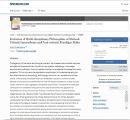| dc.description.abstract | The hegemony of the natural and biological sciences in the nineteenth and twentieth centuries coincided with the entrenchment of positivism as a superior methodology in knowledge acquisition and justification. Positivism exalted empiricism or experiential knowledge from sense perception. This not only led to the sciencization (empiricization) of humanities like ethics but also social sciences such as sociology, anthropology, economics, law, education and political science. Unfortunately, the radical empiricism embedded in positivism (scientism) bred a plethora of racist and sexist scholars who hid under the facades of positivistic science to justify slavery, colonialism, racial segregation and gender discrimination. The abolition of slavery and slave trade in the nineteenth century led to anti-colonial sentiments and agitations for independence in Africa, Asia and Latin America. A number of African countries attained independence in the 1950s and 1960s. This ensconced Pan-Africanism and its related nuances such as Pan-African governance, Pan-African development and Pan-African education. Consequently, Pan-African scholars embarked on the deconstruction of colonial methodologies and modes of knowledge embedded in the positivistic mono-perspectival schema in favor of post-colonial multi-disciplinary methodologies and interpretive philosophies of method. Feminist scholars in both the global North and South also used the post-colonial methodological paradigm to further expose the positivistic scientific methodology as androcentric and gender blind. This chapter therefore argues that multi-disciplinarity and inter-disciplinarity are simply a logical consequent of decoloniality and post-coloniality. The chapter contends that post-coloniality and decoloniality dethrone positivism and all its quantitative superiority pretexts in favor of interpretivism, multi-disciplinarity, mixed methodologism, qualitative analyses, epistemological justice and epistemological realism. | en_US |

